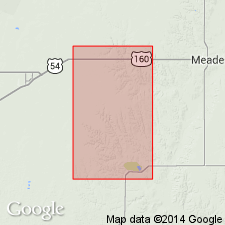
- Usage in publication:
-
- Angell member
- Modifications:
-
- Original reference
- Dominant lithology:
-
- Sand
- Gravel
- AAPG geologic province:
-
- Anadarko basin
Summary:
Pg. 55 (fig. 1), 57-58. Angell member of Ballard formation of Meade group. Name applied to sand, gravel, and cobble member at base of Ballard formation. Thickness about 7 feet. Underlies Missler member; overlies Rexroad formation. Age is Pleistocene (Nebraskan).
Type section: Sanders gravel pit, in SE/4 NW/4 sec. 7, T. 32 S., R. 28 W., Meade Co., southwestern KS. Name from old Angell Schoolhouse which was located in southeast corner of NE/4 sec. 31, T. 32 S., R. 29 W.
Source: US geologic names lexicon (USGS Bull. 1200, p. 100).
- Usage in publication:
-
- Angell Gravel Member
- Modifications:
-
- Age modified
- Biostratigraphic dating
- AAPG geologic province:
-
- Anadarko basin
Zakrzewski, R.J., 1975, Pleistocene stratigraphy and paleontology in western Kansas; The state of the art, 1974: University of Michigan, Museum of Paleontology Papers on Paleontology, no. 12., Claude W. Hibbard Memorial Volume, no. 3
Summary:
Pg. 122 (fig. 1), 124 (fig. 2), 125 (fig. 3), 126. Angell Gravel Member of Ballard Formation. Lies below Missler Silt Member of Ballard Formation. Deposits interpreted to represent pre-Nebraskan cool interval. Age is Pliocene (Blancan NALMA); Pliocene-Pleistocene boundary placed at base of Irvingtonian NALMA (base of Nebraskan-Aftonian), = 1.8 Ma.
Source: Publication.
For more information, please contact Nancy Stamm, Geologic Names Committee Secretary.
Asterisk (*) indicates published by U.S. Geological Survey authors.
"No current usage" (†) implies that a name has been abandoned or has fallen into disuse. Former usage and, if known, replacement name given in parentheses ( ).
Slash (/) indicates name conflicts with nomenclatural guidelines (CSN, 1933; ACSN, 1961, 1970; NACSN, 1983, 2005, 2021). May be explained within brackets ([ ]).

